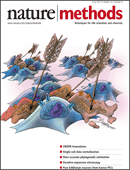 Nature Methods has retracted a 2017 paper suggesting a common gene editing technique may cause widespread collateral damage to the genome.
Nature Methods has retracted a 2017 paper suggesting a common gene editing technique may cause widespread collateral damage to the genome.
The notice has a long backstory: After the paper was published, it immediately drew an outcry from critics (including representatives from companies who sell the tool, whose stock fell after publication). Some critics argued that the authors, led by Vinit B. Mahajan at Stanford University, hadn’t employed sufficient controls, so they couldn’t be sure that the observed mutations stemmed from the tool, rather than normal background variation between mice. Only months after the paper appeared, the journal issued an expression of concern about the article. In a new preprint posted on BioRxiv on Monday, the authors concede that their critics may be right.
In the new preprint, Mahanjan and his colleagues acknowledge that the gene editing technique — known as CRISPR-Cas9 — “may not introduce numerous, unintended, off-target mutations.”
However, according to the retraction notice, Mahajan and several of his co-authors object to the retraction: Continue reading Nature journal retracts controversial CRISPR paper after authors admit results may be wrong

 A
A